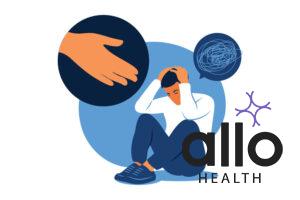Sex Addiction Symptoms

Allo Health is dedicated to personalized well-being, offering support and trusted information tailored to individual health goals. The platform emphasizes human-generated content, led by a distinguished medical team of experts, including physicians and sexual health specialists. Their commitment to credibility involves rigorous fact-checking, authoritative research, and continuous updates to ensure accurate, up-to-date information. Allo Health's unique approach goes beyond conventional platforms, providing expert-led insights and a continuous commitment to excellence, with user feedback playing a crucial role in shaping the platform's authoritative voice.

Ms Miriam is a licensed Clinical Psychologist and Psychotherapist, who completed her training and licencing from the National Institute of Mental Health and Neurosciences (NIMHANS), and has experience in working with patients in areas of adult psychiatry, child and adolescent psychiatry, addiction medicine, neuropsychology and family & marital therapy.
Why This Was Upated?
Our experts continually monitor the health and wellness space, and we update our articles when new information became available.
Updated on 22 June, 2024
- Article was updated as part of our commitment to diversity, equity, and inclusion.

"The following blog article provides general information and insights on various topics. However, it is important to note that the information presented is not intended as professional advice in any specific field or area. The content of this blog is for general educational and informational purposes only.
Book consultation
The content should not be interpreted as endorsement, recommendation, or guarantee of any product, service, or information mentioned. Readers are solely responsible for the decisions and actions they take based on the information provided in this blog. It is essential to exercise individual judgment, critical thinking, and personal responsibility when applying or implementing any information or suggestions discussed in the blog."
While the exact causes sex addiction are not fully understood, some experts believe that it may be linked to chemical imbalances in the brain, childhood trauma, or other underlying psychological concerns. However, there are common symptoms of sex addiction that should be thoroughly understood – this is to help individuals identify any signs in themselves or those they care for.
Common Symptoms & Signs of Sex Addiction
Compulsive Sexual Behavior
One of the most prominent symptoms of sexual addiction is a persistent and intense desire for sexual activity, even in the face of negative consequences. Individuals with sex addiction may engage in a range of sexual behaviors, such as pornography use, excessive masturbation, anonymous sex, and infidelity.
Compulsive sexual behavior is defined as an intense and repetitive urge to engage in sexual activities, despite the awareness of negative consequences and can significantly affect the quality of life. This behavior can manifest in many different ways, including excessive masturbation, frequent sexual encounters with multiple partners, and an obsession with pornography. While it is not classified as a diagnosable condition in the DSM-5, it is recognized as a real and potentially debilitating condition.
Symptoms of compulsive sexual behavior can vary widely depending on the individual, but some common signs include:
- Preoccupation with sex: Individuals with compulsive sexual behavior often spend a significant amount of time thinking about sex, even when it interferes with their daily functioning. They may also engage in excessive fantasizing and sexual daydreaming.
- Loss of control: One of the key symptoms of compulsive sexual behavior is the inability to control the sexual impulses. Individuals may find themselves engaging in sexual activities even when they don’t want to or know that it is not in their best interest, however they feel a loss of sense of control over their behaviors.
- Continued use despite negative consequences: Despite negative consequences to their interpersonal relationships, occupational difficulties, or financial difficulties, individuals with compulsive sexual behavior continue to engage in sexual activities.
- Withdrawal symptoms: Individuals with compulsive sexual behavior may experience withdrawal symptoms when they are unable to engage in sexual activities, such as irritability, anxiety, or low mood.
- Relationship concerns: Compulsive sexual behavior can lead to concerns in the individual’s intimate relationships, including infidelity, sexual dysfunction, and a lack of emotional connection.
- Distress: Individuals with compulsive sexual behavior may experience significant distress as a result of their behavior. They may feel shame, guilt, or embarrassment about their sexual activities.
- Risk-taking behavior: Individuals with compulsive sexual behavior may engage in risky sexual behavior, such as having unprotected sex or engaging in sexual activities with strangers.
- Loss of interest in other activities: Individuals with compulsive sexual behavior may lose interest in other activities they used to enjoy, such as hobbies or socializing with friends.
Not everyone who engages in frequent sexual behavior has a sexual addiction. However, if you or someone you know is experiencing the symptoms listed above, it may be worth seeking a healthcare provider help.

Treatment for compulsive sexual behavior typically involves a combination of psychotherapy and medication. Cognitive-behavioral therapy (CBT) and Dialectical behavioral Therapy (DBT) can be particularly effective in helping individuals identify and change negative thought patterns and behaviors related to sex addiction and help them learn better emotion regulation and distress tolerance skills needed to cope with varying situations. Medications such as antidepressants and anti-anxiety medications may also be prescribed to help manage symptoms.
It’s important to seek the guidance of a qualified mental health professional or medical professional for treatment.
Preoccupation With Sex
Those with sex addiction may find that their thoughts are consumed with sexual fantasies, desires, or memories, to the point where they are unable to focus on other aspects of their lives.
Addiction to sex, also known as hypersexuality or compulsive sexual behavior, is a condition that affects many individuals worldwide. One of the most common symptoms of sex addiction is a preoccupation with sex. This symptom can manifest in various ways and can be quite debilitating for those who experience it.
Preoccupation with sex is one of the most common symptoms of sex addiction. Individuals with this condition often find themselves constantly thinking about sex and sexual activity, to the point where it interferes with their daily life. This preoccupation can manifest in several ways, including:
- Obsessive thoughts: Individuals with sexual addiction often experience obsessive thoughts about sex and sexual activity. These thoughts may be intrusive and persistent, making it difficult for the individual to focus on anything else. These thoughts can be triggered by various stimuli, such as seeing an attractive person or hearing a sexual reference in conversation. It will be important to distinguish the same with obsessive compulsive disorders.
- Compulsive behavior: Individuals with sexual addiction may engage in compulsive sexual behavior, such as masturbating frequently or engaging in risky sexual activity. This behavior can be driven by a need to satisfy their sexual urges, which may feel uncontrollable.
- Intense cravings: Individuals with sexual addiction may experience intense cravings for sexual activity, which can be difficult to resist. These cravings may be triggered by various stimuli, such as seeing an attractive person or feeling lonely or stressed.
- Distorted cognitive schemas: Individuals with sexual addiction may have distorted thinking patterns related to sex and sexual activity. For example, they may believe that sex is the only way to feel good or that their worth is tied to their sexual prowess. These distortions in cognition and schemas can contribute to the preoccupation with sex and make it difficult for them to change their behavior.
- Difficulty controlling thoughts and behavior: Individuals with sexual addiction may have difficulty controlling their thoughts and behavior related to sex. They may try to stop thinking about sex or engaging in sexual activity but find that they are unable to do so. This sense of loss of control over their thoughts and behaviors can cause significant distress to the individual.
Effects of preoccupation with sex
The preoccupation with sex that is characteristic of sex addiction can have a range of negative effects on an individual’s life. These effects may include:
- Interference with daily life: The preoccupation with sex can interfere with an individual’s daily life, making it difficult to focus on work, school, or other responsibilities.
- Relationship concerns: Individuals with sex addiction may experience relationship concerns as a result of their preoccupation with sex. They may struggle to form or maintain intimate relationships and may also engage in infidelity in the relationship.
- Negative self-esteem: The preoccupation with sex can also contribute to negative self-esteem. Individuals with sex addiction may feel ashamed or guilty about their behavior, which can lead to feelings of low self-worth.
- Risky activities or behavior: The preoccupation with sex can also lead to risky sexual behaviors, which can increase the risk of sexually transmitted infections (STIs) and unwanted pregnancy.
Loss Of Control
Sex addiction can lead to a sense of loss of control over one’s own behavior. Individuals may find that they are unable to resist sexual urges or impulses, despite their best efforts.
Loss of control is a defining characteristic of sex addiction. People who suffer from sex addiction find it challenging to control their sexual behaviors and impulses, despite awareness of negative consequences. This lack of control can lead to a range of concerns, including relationship difficulties, financial troubles, and legal concerns.
- One of the most significant symptoms of sex addiction is an inability to stop engaging in sexual behaviors, even when the individual wants to. This can include compulsive masturbation, pornography use, or engaging in sexual activities with multiple partners. The person may feel that they have lost all control over their sexual behavior and may feel ashamed or guilty about their actions.
- Loss of control in sex addiction can also lead to relationship concerns. The person may have difficulty maintaining healthy relationships due to their addiction. They may lie to their partners about their sexual behaviors, engage in infidelity, or prioritize their addiction over their relationship. This can lead to feelings of betrayal, mistrust, and ultimately, the breakdown of the relationship.
The negative consequences of loss of control in sex addiction are not limited to personal relationships. The person may also experience financial concerns due to their addiction, such as spending excessive amounts of money on pornography or sex workers. They may also face legal concerns, such as being arrested for public indecency or engaging in illegal sexual activities.
Emotional And Physical Distress
Those with sex addiction may experience a range of emotional and physical symptoms, such as anxiety, depressive symptoms, low self-esteem, and sexual dysfunction.
Emotional Distress
Sex addiction can cause significant emotional distress for the individual, their partners, and loved ones. Here are some common emotional symptoms of sex addiction:
- Anxiety and Depression: Individuals with sex addiction may experience symptoms of anxiety and depression due to the shame, guilt and high levels of distress and daily dysfunction associated with their behavior.
- Low self-esteem: They may experience feelings of low self-worth and disruptions in their sense of self due to the thoughts and behaviors associated with their addiction, leading to overall low self-esteem.
- Relationship concerns: They may have difficulties in maintaining healthy relationships due to their addiction. They may also experience feelings of guilt and shame, which can cause them to withdraw from their partners.
- Isolation: Individuals with sex addiction may feel isolated and alone, as they may feel afraid to share their addiction with others, for fear of judgement and lack of understanding.
- Difficulty with intimacy: They may struggle with intimacy and have difficulty forming emotional connections with others due to their addiction.
Physical Distress
Sex addiction can also cause physical distress. Here are some common physical symptoms of sex addiction:
- Fatigue: Individuals with sex addiction may experience fatigue due to the physical and emotional toll of their addiction.
- Physical injuries: They may experience physical injuries such as bruises, cuts, or abrasions from engaging in high-risk sexual behavior.
- STDs and other infections: They may be at higher risk for sexually transmitted infections due to their high-risk sexual behavior.
- Sleep disturbances: They may experience difficulty sleeping due to preoccupation with sexual thoughts or engaging in sexual activities late at night.

Does Sex Addiction Mean High Sex Drive?
Sex addiction and high sex drive are two terms that are often used interchangeably. However, they are not the same thing. While high sex drive may lead to an increased interest in sexual activities, those with a sex addiction on the other hand, are unable to exert control over their sexual activities and behavior and experience a high degree of distress as a result of it.
Understanding High Sex Drive
High sex drive, also known as hypersexuality, is a condition where an individual has a persistent and intense desire for sexual activity. It is not considered a disorder unless it causes distress or interferes with the person’s daily life. Individuals with high sex drive often have a higher libido than others and may engage in sexual activities more frequently.
Several factors can contribute to high sex drive, including biological, psychological, and social factors. For instance, some medical conditions, such as manic symptoms of bipolar disorder and hyperthyroidism, can increase sex drive. Similarly, certain medications, such as antidepressants, can decrease sex drive. Psychological factors, such as stress and anxiety, can also have an impact individual’s sex drive.
Understanding Sex Addiction
- Sex addiction, also known as hypersexual disorder, is a behavioral addiction characterized by compulsive and uncontrollable sexual behavior.
- Individuals with sex addiction have an overwhelming or constant urge to engage in sexual activities, despite the negative consequences it may have on their lives. They may spend an excessive amount of time engaging in sexual behaviors or may engage in risky sexual activities.
- Sex addiction can have a severe impact on an individual’s life, affecting their relationships, career, and overall well-being. It can lead to feelings of shame, guilt, and low self-esteem.
- Sex addiction is not officially recognized as a mental disorder in the Diagnostic and Statistical Manual of Mental Disorders (DSM-5), but it is recognized as a compulsive disorder.
- Individuals with sex addiction may use sex as a way to deal with emotional pain or stress. They may also use sex as a way to escape from reality and avoid dealing with their concerns. This can lead to a cycle of addiction, where the person uses sex as a way to cope with negative feelings, leading to more shame and guilt, which then fuels the addiction further.
- In addition to the use of sex as a coping mechanism, individuals with sex addiction may also engage in risky sexual behaviors. They may have unprotected sex with multiple partners, engage in public sex acts, or participate in BDSM activities that can be dangerous. Despite knowing the risks involved, the person may feel compelled to continue engaging in these behaviors due to their addiction.
Difference between High Sex Drive and Sex Addiction
While high sex drive and sex addiction may share some similarities, they are not the same thing.
- High sex drive is a natural and healthy aspect of human sexuality, whereas sex addiction is a behavioral addiction that can have negative consequences.
- Individuals with high sex drive may have a greater interest in sexual activities, but they do not have a compulsion to engage in them. They are still able to control their sexual behaviors and make decisions based on their values and priorities.
- In contrast, individuals with a sex addiction have a compulsive and uncontrollable urge to engage in sexual activities, even if it puts into jeopardy their health, relationships, or career.
Not everyone with high sex drive will develop a sex addiction. Similarly, not everyone with a sex addiction has a high sex drive. The two conditions are separate and distinct.
Treating High Sex Drive and Sex Addiction
Treatment for high sex drive and sex addiction will depend on the underlying causes and the severity of the condition.
- For individuals with a high sex drive, treatment may involve addressing any underlying medical or psychological conditions that may be contributing to the increased libido. Counseling and therapy may also be helpful in addressing any relationship or intimacy concerns.
- For individuals with a sex addiction, the treatment may involve a combination of psychotherapy, support groups, and medication. Cognitive-behavioral therapy (CBT) can be particularly helpful in identifying and changing the negative thought patterns and behaviors associated with sex addiction.
- Support groups, such as Sex Addicts Anonymous (SAA), can also provide a safe and supportive environment for individuals to share their experiences and receive peer support.
How to Seek Help for Sex Addiction
- If you or someone you know is experiencing sex addiction symptoms, it is important to seek help from a licensed mental healthcare professional.
- A therapist with experience in treating sex addiction can provide the appropriate therapeutic guidance needed in addressing the underlying causes of the condition, as well as in developing adaptive coping strategies and tools to manage sexual urges and impulses.
- In addition to therapy, support groups such as Sex Addicts Anonymous (SAA) can be a valuable resource for those struggling with sex addiction. These groups provide a safe and supportive environment for individuals to share their experiences and connect with others who have gone through similar struggles.
- It is also important to address any co-occurring mental health conditions that may be contributing to sex addiction symptoms. This may include conditions such as anxiety, depression, or trauma-related disorders, which can exacerbate sexual compulsions and behaviors.
- Sex addiction can be a difficult and isolating condition, but with the right treatment and support, individuals can overcome its negative impact on their lives. By recognizing the common symptoms of sex addiction and seeking help from a licensed mental healthcare professional, those struggling with this condition can take the first step towards a healthier and more fulfilling life.
Spouses Of Sex Addicts: How To Cope
Sex addiction can be a devastating experience for not only the person going through it but also for their spouse. The discovery of a spouse’s sex addiction can be a traumatic experience that can leave the other partner feeling hurt, betrayed, and confused. Coping with the discovery of a partner’s sex addiction can be challenging, but it is possible.
- Seek Professional Help: When a spouse discovers their partner’s sex addiction, it can be an overwhelming and isolating experience. Seeking help from a healthcare provider can provide the support and guidance necessary to cope with the trauma of the discovery. Marriage counseling or couples counseling may help provide a safe space for partners to discuss concerns. There are various therapists, support groups, and counselors who specialize in helping individuals dealing with the impact of sex addiction on their relationships. These professionals can provide a safe and non-judgmental space for spouses to process their emotions, ask questions, and get the support they need to move forward.
- Practice Self-Care: Discovering a spouse’s sex addiction can be emotionally, physically, and mentally exhausting. Practicing self-care is essential for spouses to prioritize their own well-being and avoid burnout. Self-care can include anything from exercising, meditating, taking a hot bath, or spending time with friends and family. It’s important to remember that taking care of oneself is not selfish but necessary for healing.

- Educate Yourself: Learning more about sex addiction can help spouses better understand the addiction, how it impacts their partner, and the recovery process. Education can help spouses to develop empathy and avoid placing blame on themselves or their partner. There are various resources available, including books, websites, and support groups, that can provide spouses with the information they need to make informed decisions about their relationship.
- Set Boundaries: It’s important for spouses to set clear boundaries with their partner to protect themselves and their relationship. Boundaries can include limits on behavior, open communication, and access to technology. Boundaries help to establish trust and create a sense of safety within the relationship. It’s important for spouses to communicate their boundaries in a clear and assertive manner and to be consistent in enforcing them.
- Practice Forgiveness: Forgiveness is a challenging but essential part of the healing process for both partners. Forgiveness is not about forgetting or excusing the behavior, but about letting go of the anger and resentment that can impact their relationship. Forgiveness can help spouses to move forward and focus on rebuilding their relationship.
Key Takeaways
- Understanding Sex Addiction: Sex addiction, or hypersexual disorder, is characterized by compulsive and uncontrollable sexual behavior, leading to distress and dysfunction in daily life. It is not officially recognized as a mental disorder, but it can have severe consequences on an individual’s life.
- Symptoms of Sex Addiction: Symptoms include a persistent and intense desire for sexual activity, preoccupation with sex, loss of control over behavior, emotional and physical distress, and engaging in risky sexual behaviors.
- Distinguishing High Sex Drive: High sex drive, or hypersexuality, is a natural aspect of human sexuality characterized by a strong desire for sexual activity. It differs from sex addiction in that individuals with high sex drive can still control their behavior.
- Seeking Professional Help: When coping with a partner’s sex addiction, seeking professional help is crucial. Therapists, support groups, and counselors who specialize in sex addiction can provide the necessary support and guidance.
- Practicing Self-Care: Coping with a partner’s sex addiction can be emotionally and mentally draining. Spouses should prioritize self-care, engaging in activities that promote their well-being and prevent burnout.
- Setting Boundaries and Practicing Forgiveness: Establishing clear boundaries in the relationship is vital for trust and safety. Forgiveness, while challenging, is an essential part of the healing process for both partners, allowing them to move forward and rebuild their relationship.
Frequently Asked Questions
Q: Is ‘sex addiction’ an official diagnosis?
A: Sex addiction is not officially recognized as a mental disorder in the Diagnostic and Statistical Manual of Mental Disorders (DSM-5). It is considered a controversial diagnosis. However, it is acknowledged as a compulsive disorder and is a subject of ongoing debate and research in the field of mental health.
Q: Are porn addiction and sex addiction related?
A: Yes, an addiction to porn can lead to sex addiction or vice versa. They both involve compulsive and uncontrollable behaviors related to sexual activity. However, they can also exist independently, with individuals primarily struggling with one form of addiction over the other.
Q: What early-life environmental factors contribute to sex addiction?
A: Early-life environmental factors contributing to sex addiction can include experiences of trauma, abuse, neglect, or exposure to explicit sexual content at a young age. Additionally, growing up in an environment with limited or unhealthy discussions about sexuality can impact one’s relationship with sex later in life.






































